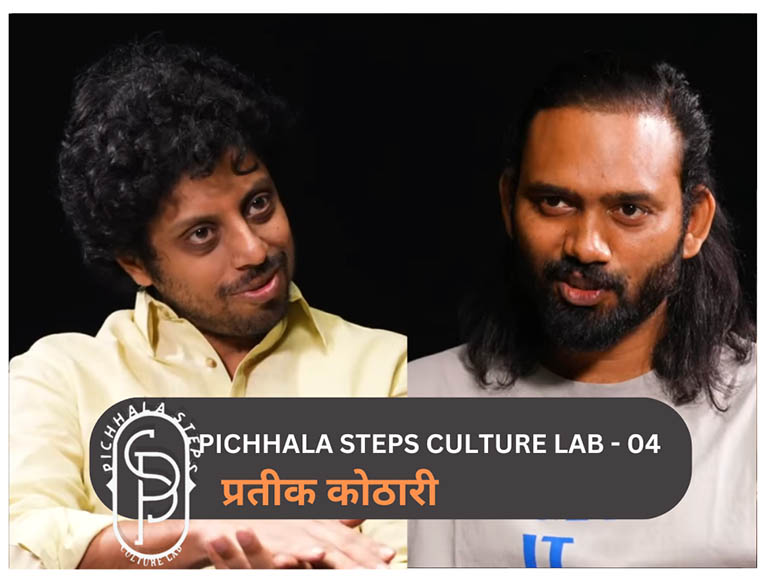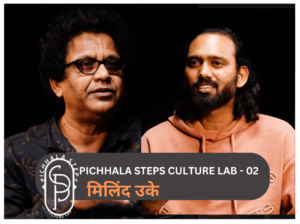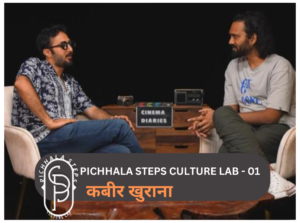Intro: Satish: Thank you very much, Pratik, for coming on our show.
Pratik: Thank you, thank you, Satish.
Moderator Satish: Pratik, I was discussing with you backstage that you are running a campaign for short film screenings. Tell us about it.
Pratik:Campaigns may sound political, but it’s not. It’s a community thing. We run a campaign called White Wall Screenings. It’s been almost 7 years. We started it in 2017 or 2018. It’s a cafe called Habitat in Khar. That’s where it started. It started because I made a short film, “Oh Hello,” which you may have seen. A lot of good things happened with it. It was part of an anthology and was released in cinemas.
When anthologies are released in India, they are not taken seriously. After a week, it was released in theatres. I always had a problem: if a live audience is watching a short film, which has a short duration, how do they respond to it? Or if I need to know from an audience, as a filmmaker, how they made the film, or what challenges they faced, how do they interact? If you make a short film and it goes on any platform, or on YouTube, it’s a good thing that it gets a wide audience.
Millions of people can watch it. But when you read the comment section, most of the comments are like, “It was fun,” or “10 minutes wasted.” As a filmmaker, I was anticipating how the audience would respond. That curiosity instigated the thought of White Wall Screenings.
Balraj, the owner of Habitat, I knew him because he used to do theatre there. I asked him, what I loved about Habitat was the acoustics. Sound was always very important to me. I said, if we do a screening, we’ll do it here. The acoustics are very good. You get that cinema feel. The projection was also decent. I said, I can arrange for 3-4 films. We can do one event.
For a 15-minute short film, in a city like Bombay, you can’t expect people to leave their engagements and come here to watch a film. We collected 2-3 more films. We did the screening. Balraj said, Pratik, what’s the point of doing it once? We should do it continuously. That’s how White Wall Screenings started. Every alternate Sunday, we used to present a collection of short films to the audience. We used to call the filmmakers for Q&A.
We have done around 500 films. We got a lot of encouragement from the filmmakers. We came to know that many aspiring filmmakers don’t have a platform. They have made a film, but don’t know what to do with it. The small platform that we can give them, that is my biggest takeaway. Many times, the audience tells me, Pratik, let’s make a short film. That’s my takeaway from White Wall Screenings. When 50-100 people come and say, this has inspired me to go and make a short film, I think my purpose is achieved. With God’s grace, we have been working with multiple centres.
We had a program called Short Film Tour, where we did screenings of short films across multiple cities. My second question was, let’s start with Bombay.
Moderator Satish: As you said, the duration is 15 minutes. There are very few chances that you can gather people and bring them. You have also started in Dehradun. Do you go everywhere? Or does your team go for Q&A?
Pratik: There is a logistical challenge in that. It is about the economics. From an economic point of view, if I or anyone has to travel, there is a cost.What we have done is, we have had some local collaborations. First of all, I am very thankful to Delhi Stories, which is an institution in Delhi. We were talking to them. They were very keen on any way of screening in Delhi. We partnered with them and they took care of the Delhi-Dehradun event. I think it is easier to go from Delhi to Dehradun.
I was in Bombay. We had another friend in Bangalore, Ekta’s Gathering. She kind of took care of the Bangalore event. Collaborating with like-minded and right people and identifying them is very important. You want to do something with enthusiasm. We didn’t know where it would go.
Let’s see. Instead of doing nothing, let’s do something. We will meet people. We will interact. We will learn from a filmmaker. You said a very good thing. You started it. You had a question in your mind. We make films. We release them on YouTube. We get comments like you wasted 10 minutes. You made a good film. But the creative process we don’t get a chance to discuss or do a face-to-face Q&A. Screening is a platform where an aspiring filmmaker or writer talks to the filmmaker and the audience. It’s important because we get objectivity.
Our filmmaking stream is full of uncertainties. As Chaplin said, when you see life in a close-up, it’s a tragedy. When you see it in a long shot, it’s a comedy. This is a rough translation of what he meant to say or what he said. When you meet 2-3 filmmakers every day and get to know their story, you realize you are not alone. Who is going through this? You get a spirit that everyone is fighting.
We are a small part of it. It’s not like we are the only ones getting singled out. It’s like if I want to put a short film on a platform or take it to a festival, I’m not the only one coming to terms with it or struggling with it. In our industry, we are very vulnerable to all these things because there are many variables. We get objectivity and a larger picture. Another thing is for example, you made a film and I made a film.
I made a few mistakes. I had some challenges which I overcame. You had some other challenges which you overcame and made a film. I learned from this that if I had a similar situation with him, he would have come up with a solution. What resources do I have to come up with a solution? It’s important to be subconscious because filmmaking is at the end of the day problem-solving. From what you anticipated to what you didn’t anticipate, you will face all kinds of problems.
That’s why I was saying that actors are actors and we get to know. They come forward and talk to us because they are in front of the screen. But the creative process and the team behind it including the writer, director, filmmaker and their hard work for many nights, very few people know about their hard work and struggle. That’s why we have an organisation called Pitch Life Steps. We have a small initiative where we try to assist aspiring writers and filmmakers who have blurred vision so that they can in making their decisions. You are doing a great job with your short film which is 15 minutes long. The White Wall Screenings is doing a great job.
I expect you to praise me a little. No, no. What I was saying is that what you are doing is required and essential. It’s not a joke. It’s essential because like you said if we want to access something it’s not accessible. Like I was saying even in my childhood my father was a DOP. So he did Chanakya Show, Ghayal, films, many films of the 90s and some sections of Andaz Apna Apna. But we also had to explain to our relatives, family friends, acquaintances what a cinematographer is. Like you said people have an idea about actors and directors but not about writers which comes first in a project. It all starts from there. Cinematographer, sound designer, sound designer we filmmakers don’t know what sound design can do. Or we demean it.
But what you are doing is kind of behind the scenes with a forefront and talking to them. This initiative is also important because if someone wants to go in that field they should have access and information. And secondly generally if people are listening or watching this they should know that on an average feature film not in terms of production but generally 300-400 people work. So generally we dismiss the film that it is a bad film. It is a bad film.
So what happens is at a given point we discredit the work of 300-500 people. It is possible that some people didn’t work passionately but some people tried their best to give their best to the project. As a consumer you can do it because at the end of the day if you buy a ticket for Rs. 200 or buy a subscription you have the right to have any opinion. But we don’t know how many people in the making of a film and how critical it is. So what you are doing to build awareness and contribute to the project is very important in my opinion.
Moderator Satish: You told me that your father was a cinematographer and it was difficult to explain what a cinematographer does and what his profession is and what he does in films. So whatever work we do or whatever profession we have or whatever we learn or whatever we do comes from our upbringing and it has a huge contribution in our life. How you got influenced and what you learnt comes from that. It also reflects in the work that you come from and your mentality reflects in your work.
So if you can tell me about your childhood and your inspirations. Because your father was from this field and what you learnt from him and apart from your dad where did you choose cinema or cinema chose you?
Pratik: I don’t know whether cinema chose me. Since childhood, being around a film set was a common thing. And watching a film was an event in itself. Because when a family goes to watch a film and at that time when there were no multiplexes it was an
event. You are having popcorn and I was more interested in that. So that experience was very surreal and the excitement was high. To a level that whenever I watched a film and came back home I used to enact the scenes. If the hero was doing this I used to do this. But at that time I didn’t have the understanding of cinema but I knew that this makes me happy.
As a child I used to feel that there are people who are making films and I was always attracted to it. I was not sure whether I wanted to make films but I knew that I wanted to tell stories. So you may find it funny that when I was young there was a popular drink called Rasna. I don’t know if it’s still popular. I used to have Rasna. So what I used to do was that I used to act and make stories like Rasna ad in 3 minutes. So I used to enact and create stories. And that time there was a camera with film. So I used to shoot with my father’s camera. When I was young I didn’t know the technical details. But the idea was there. As a child I used to act, do funny things, write poems and stories. The creative process was always there. It was just not a directed process.
So coming back to the upbringing as you said it’s very important. And the way we do things it’s a reflection of what we are. The thing is when we were young there was no access to internet and information was limited. Now you can google anything. There are courses available for every creative process. At that time you had to read books. Now the definition of knowledge has changed.
So the thing is when I used to go to my father’s set I used to watch him working. So I had no pressure from him because my father was very grounded and sorted. So I used to tell my father that I want to do this and that. He used to say don’t think too much. Focus on doing. So the thing is I used to help him in his work. Like I used to be his assistant and learn from him. And I also made short films. The White Wall Screening is an extension of that process.
My father was a technician and he used to work behind the camera. And I also worked behind the camera initially. So the thing is the joy of telling stories, the joy of making people laugh, making people cry, making people think and inspiring them is what kept me going. And that is what inspires me till today.
Moderator Satish: As you said, being a part of a film set from a young age, enacting scenes, and having that early exposure to storytelling and creative expression must have had a significant influence on your career path. Can you share more about how your father’s work and your early experiences shaped your understanding and approach to filmmaking?
Pratik: Definitely. My father’s work as a cinematographer gave me a unique perspective on the technical aspects of filmmaking from a very young age. Watching him work, I learned about the importance of lighting, framing, and the meticulous attention to detail required to create compelling visuals. This technical foundation has been invaluable in my own work.
But more than the technical skills, it was the storytelling aspect that fascinated me the most. I realized that behind every shot, there is a story to be told. This realization made me appreciate the power of visual storytelling and the impact it can have on an audience.
Growing up on film sets also taught me the value of collaboration. Filmmaking is a team effort, and seeing how my father interacted with directors, actors, and other crew members highlighted the importance of teamwork and communication. It made me understand that every role, no matter how small, contributes to the final product.
These early experiences instilled in me a sense of respect for the craft and the people involved in it. They also sparked a desire to explore different aspects of filmmaking, from writing and directing to producing. This holistic understanding




